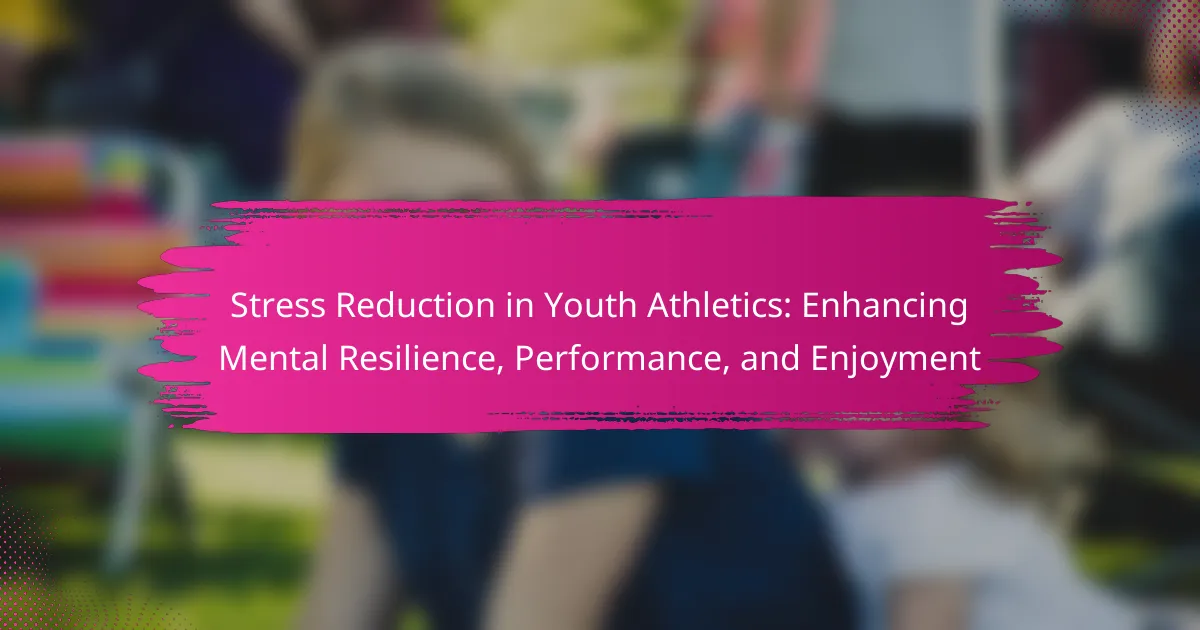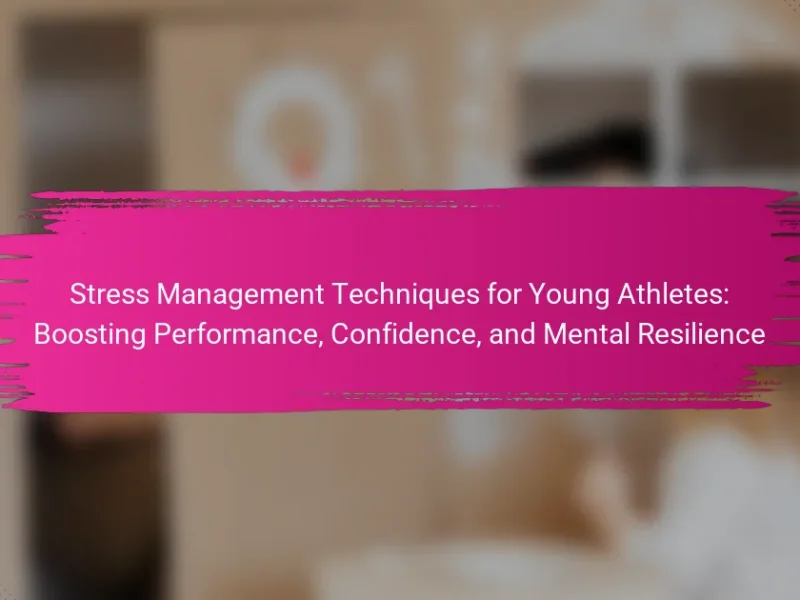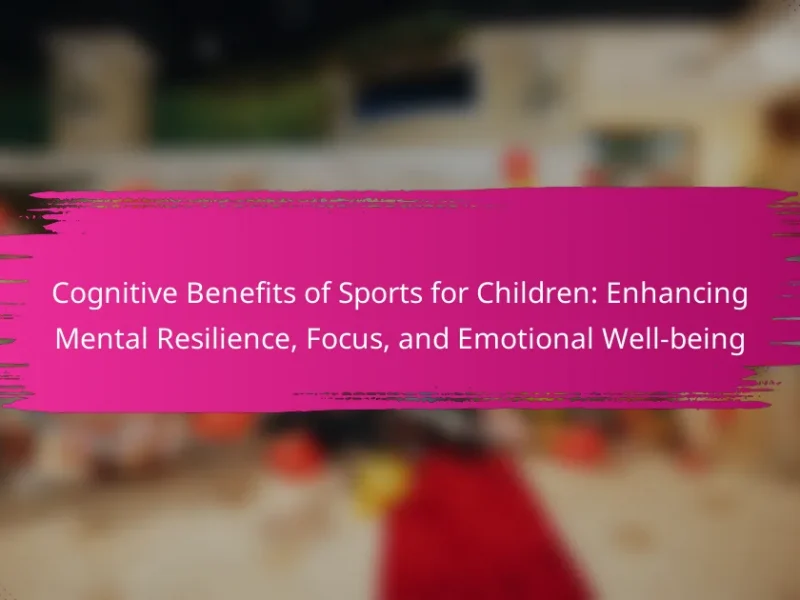Stress reduction is essential for young athletes to enhance mental resilience, boost performance, and increase enjoyment in sports. Effective techniques like mindfulness training and structured relaxation exercises can help manage anxiety and improve focus. Creating a supportive environment fosters open communication and encourages positive self-talk, reducing burnout and promoting long-term participation. Emphasizing balance between competition and enjoyment cultivates a healthy athletic mindset.
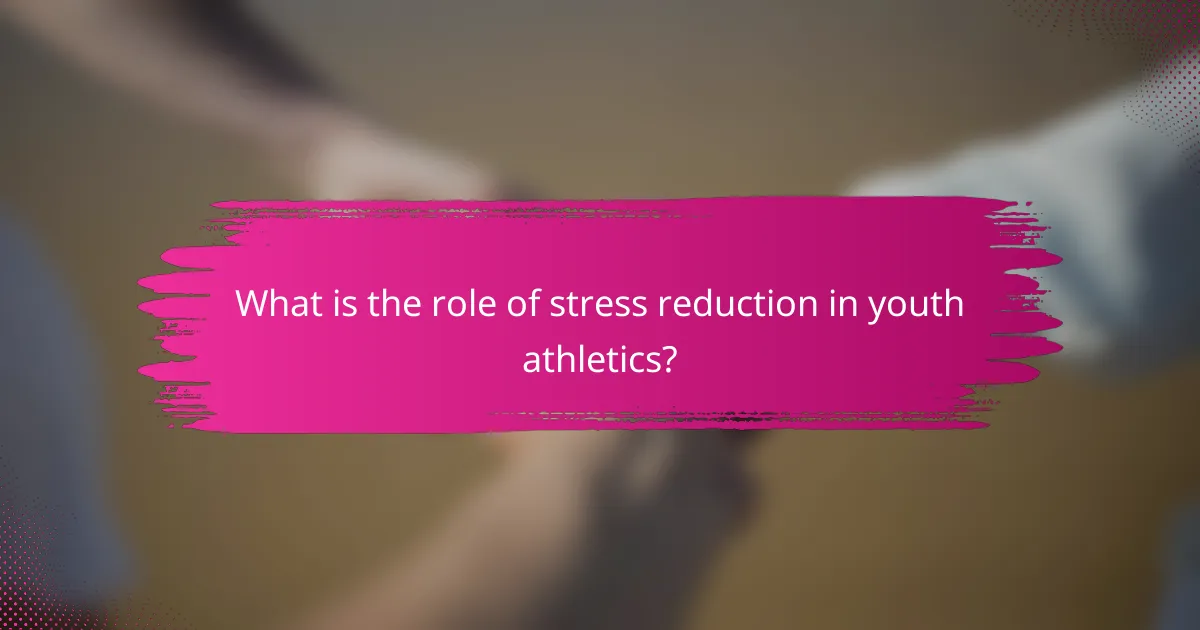
What is the role of stress reduction in youth athletics?
Stress reduction plays a crucial role in youth athletics by enhancing mental resilience, performance, and enjoyment. It helps young athletes manage anxiety and pressure, leading to improved focus and confidence during competitions.
Research indicates that stress management techniques, such as mindfulness and relaxation exercises, can significantly enhance athletic performance. For instance, athletes who utilize these strategies often report higher levels of satisfaction and motivation, contributing to a more positive sporting experience.
Additionally, fostering a supportive environment that prioritizes mental well-being can reduce burnout and promote long-term participation in sports. Coaches and parents should emphasize the importance of balancing competition with enjoyment to cultivate a healthy athletic mindset.
In summary, effective stress reduction strategies are vital for developing resilient young athletes who can thrive both on and off the field.
How does stress impact mental development in young athletes?
Stress negatively impacts mental development in young athletes by hindering focus, confidence, and enjoyment. High stress levels can lead to anxiety, burnout, and reduced performance. Research indicates that stress management techniques enhance mental resilience, allowing athletes to thrive under pressure. Effective stress reduction strategies, such as mindfulness and positive reinforcement, can improve overall athletic experience and mental health.
What are the common stressors faced by youth in sports?
Common stressors faced by youth in sports include performance pressure, parental expectations, and fear of failure. These factors can significantly impact mental resilience and enjoyment in athletics.
Performance pressure arises from competition and self-imposed standards, often leading to anxiety. Parental expectations can create additional stress, as youth athletes may feel compelled to meet their family’s aspirations. Fear of failure is prevalent, as young athletes worry about disappointing coaches, teammates, and themselves.
Additionally, balancing academics and sports can overwhelm youth, affecting both their performance and mental health. Social dynamics, such as peer competition and bullying, contribute further to stress levels. Addressing these stressors is essential for enhancing mental resilience and overall enjoyment in youth sports.
How do competition and performance expectations contribute to stress?
Competition and performance expectations can significantly increase stress in youth athletes. High pressure to perform often leads to anxiety, impacting mental resilience and enjoyment. Research indicates that when young athletes feel they must meet external expectations, their focus shifts from personal growth to fear of failure. This shift can diminish their overall performance and mental well-being. As a result, fostering a supportive environment emphasizing personal development over competition may enhance both mental resilience and enjoyment in youth athletics.
What social pressures affect young athletes?
Young athletes face significant social pressures that can impact their mental resilience and performance. These pressures stem from expectations set by parents, coaches, and peers.
Parental expectations often heighten anxiety, pushing young athletes to meet high standards. Coaches may prioritize winning, which can overshadow enjoyment and personal development. Peer competition can create a toxic environment, leading to stress and burnout.
Additionally, social media amplifies these pressures, as athletes compare their achievements to others. This constant exposure can erode self-esteem and increase stress levels.
Addressing these social pressures is crucial for enhancing mental resilience, ensuring that young athletes maintain a healthy balance between competition and enjoyment.
What are the universal benefits of stress reduction techniques?
Stress reduction techniques enhance mental resilience, performance, and enjoyment in youth athletics. These methods improve focus, reduce anxiety, and foster a positive mindset. As a result, athletes experience increased motivation and satisfaction in their sports activities. Regular practice of these techniques can lead to long-term benefits, such as improved emotional regulation and better coping strategies during competitive scenarios.
How can stress reduction improve athletic performance?
Stress reduction significantly enhances athletic performance by improving focus, resilience, and enjoyment. Athletes with lower stress levels can concentrate better, leading to improved decision-making during competition. Research shows that mental resilience gained from stress management techniques, such as mindfulness and relaxation exercises, correlates with better performance outcomes. Furthermore, athletes who enjoy their sport are more likely to engage consistently, fostering skill development and teamwork. Stress reduction ultimately creates a positive feedback loop, enhancing both individual performance and overall team dynamics.
What mental resilience skills can be developed through sports?
Sports can develop mental resilience skills such as stress management, focus, and adaptability. Engaging in athletics teaches youth to cope with pressure, enhancing their performance and enjoyment. Stress management is vital; studies show athletes experience lower anxiety levels. Focus improves through goal setting and practice, fostering concentration. Adaptability is cultivated by facing challenges, helping youth navigate setbacks effectively. These skills contribute to overall mental well-being and success in various life aspects.

What unique strategies can enhance stress reduction in youth athletics?
Incorporating unique strategies can significantly enhance stress reduction in youth athletics. Techniques such as mindfulness training, cognitive-behavioral approaches, and structured relaxation exercises promote mental resilience and enjoyment.
Mindfulness training teaches athletes to focus on the present moment, reducing anxiety about performance. Cognitive-behavioral approaches help youth reframe negative thoughts, fostering a positive mindset. Structured relaxation exercises, like deep breathing and progressive muscle relaxation, can lower physiological stress responses.
Additionally, creating a supportive team environment encourages open communication, allowing young athletes to express their feelings. Implementing regular feedback sessions can help them understand their progress, thereby reducing performance-related stress. These strategies collectively enhance mental resilience, improve performance, and increase overall enjoyment in youth athletics.
How can mindfulness practices be integrated into training?
Mindfulness practices can be integrated into training by incorporating techniques like breathing exercises, visualization, and focused attention. These methods help athletes manage stress, enhance mental resilience, and improve performance. Regular sessions can be scheduled before or after practice, promoting a calm mindset. Coaches can also model mindfulness behaviors, encouraging athletes to adopt these practices in competition. Research shows that mindfulness training can lead to improved focus and enjoyment in sports, contributing to overall athletic development.
What role does positive reinforcement play in reducing stress?
Positive reinforcement significantly reduces stress in youth athletics by fostering a supportive environment. This approach enhances mental resilience, improving athletes’ performance and enjoyment. Recognizing achievements, no matter how small, builds confidence and motivates continued effort. Studies indicate that positive feedback can lower anxiety levels and promote a sense of belonging among young athletes. By emphasizing strengths, coaches can cultivate a positive atmosphere that encourages growth and reduces stress, ultimately benefiting overall athletic experience.
How can coaches effectively use feedback?
Coaches can effectively use feedback by providing specific, actionable insights that promote mental resilience in youth athletes. Constructive feedback enhances performance and enjoyment by focusing on individual strengths and areas for improvement. Regularly soliciting athlete input fosters a supportive environment, encouraging open communication. By setting clear expectations and celebrating achievements, coaches can reduce stress and enhance overall athletic experiences.
What innovative programs are being implemented to support mental health?
Innovative programs supporting mental health in youth athletics focus on stress reduction and resilience. Programs like mindfulness training and emotional regulation workshops enhance mental resilience, improve performance, and increase enjoyment. For instance, schools are implementing team-building exercises that foster a supportive environment. These initiatives help athletes manage competition pressure, promoting long-term mental well-being.

What are the rare but impactful approaches to mental development in sports?
Integrating rare approaches to stress reduction can significantly enhance mental resilience in youth athletics. Techniques such as mindfulness training and cognitive behavioral strategies foster emotional regulation and focus. Research shows that athletes who engage in mindfulness report reduced anxiety and improved performance metrics. Additionally, incorporating nature exposure and creative expression into training routines can elevate enjoyment and motivation. These unique methods cultivate a holistic development environment, empowering young athletes to thrive both on and off the field.
How does individualized coaching affect stress levels?
Individualized coaching significantly lowers stress levels in youth athletes. Tailored support enhances mental resilience, allowing athletes to manage pressure effectively. Coaches focus on personal strengths, fostering a positive environment that promotes enjoyment and performance. Studies show that athletes receiving personalized coaching report lower anxiety levels and improved coping strategies.
What unique community resources can support young athletes?
Community resources that support young athletes include mental health workshops, mentorship programs, peer support groups, and access to sports psychologists. These resources enhance mental resilience, improve performance, and increase enjoyment in athletics. Local organizations often provide tailored programs that address stress management and coping strategies. Engaging in these resources fosters a supportive environment, essential for young athletes’ overall well-being.
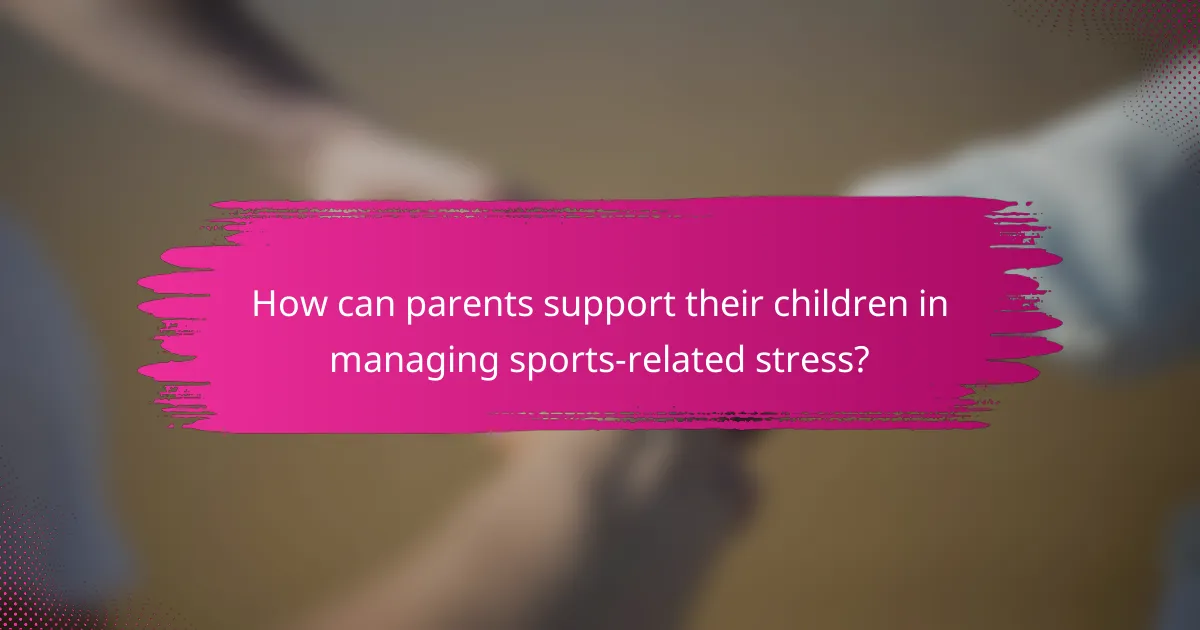
How can parents support their children in managing sports-related stress?
Parents can support their children in managing sports-related stress by fostering open communication, encouraging balanced perspectives, and promoting healthy coping strategies. Active listening allows parents to understand their child’s feelings, which can reduce anxiety. Encouraging a focus on effort rather than outcomes helps children enjoy sports more and alleviates pressure. Teaching relaxation techniques, such as deep breathing or visualization, can enhance mental resilience. Additionally, setting realistic expectations and celebrating small achievements can boost confidence and enjoyment in youth athletics.
What communication strategies can help alleviate pressure?
Effective communication strategies can significantly alleviate pressure in youth athletics. Encouraging open dialogue fosters a supportive environment, enabling young athletes to express their feelings. Active listening by coaches and parents validates emotions, enhancing mental resilience. Positive reinforcement boosts confidence, while setting realistic expectations reduces performance anxiety. Incorporating team-building activities strengthens relationships, promoting camaraderie and enjoyment in sports. Regular feedback sessions can help athletes reflect on their experiences, facilitating personal growth and resilience.
How can parents model healthy stress management practices?
Parents can model healthy stress management practices by demonstrating effective coping strategies. They can show how to handle pressure through open communication, mindfulness techniques, and physical activity. For example, parents can share their experiences of overcoming challenges, emphasizing resilience. Engaging in family activities that promote relaxation, such as yoga or nature walks, further reinforces these practices. By prioritizing mental health discussions, parents create an environment where stress management is normalized and valued.
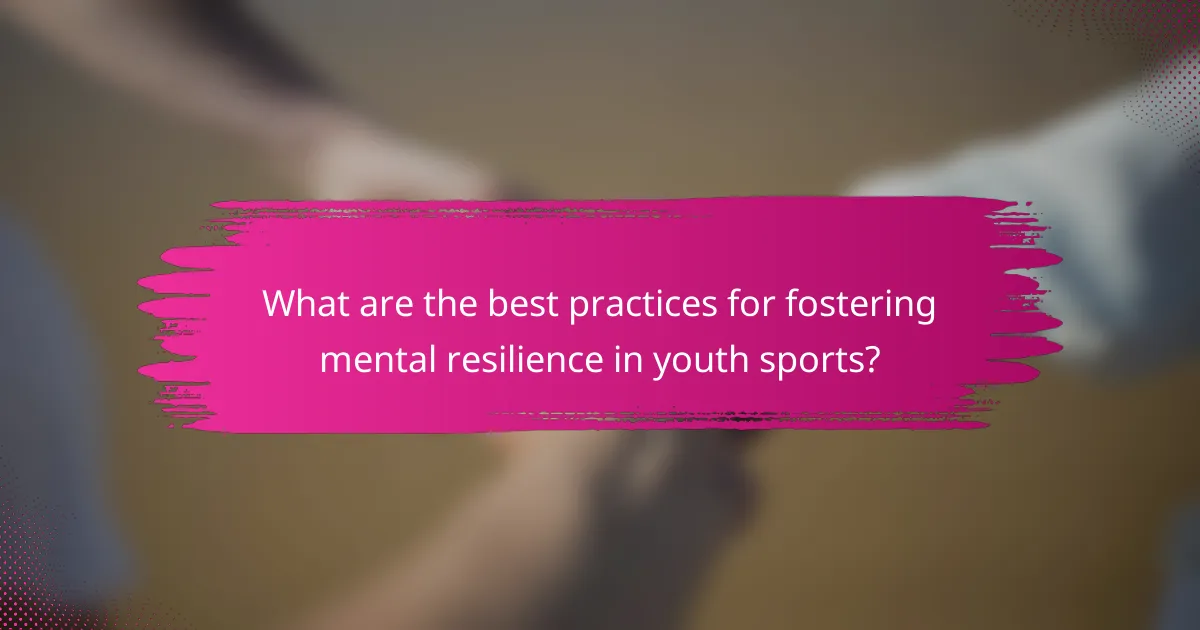
What are the best practices for fostering mental resilience in youth sports?
To foster mental resilience in youth sports, focus on creating a supportive environment, promoting positive self-talk, and teaching coping strategies. Encourage open communication between coaches, parents, and athletes. Incorporate mindfulness practices to help athletes manage stress effectively. Provide opportunities for skill development to boost confidence and enjoyment in the sport.
What common mistakes should be avoided in youth athletics?
To enhance mental resilience in youth athletics, avoid common mistakes that can hinder performance and enjoyment. These include overemphasis on winning, neglecting mental health, and poor communication with young athletes.
Overemphasis on winning can create undue pressure, leading to stress and burnout. Prioritizing enjoyment and personal growth fosters a healthier athletic experience. Neglecting mental health can result in anxiety and decreased performance; incorporating stress-reduction techniques is essential. Lastly, poor communication can create misunderstandings; fostering open dialogue builds trust and encourages athletes to express their feelings.
How can coaches create a supportive team environment?
Coaches can create a supportive team environment by fostering open communication and emphasizing team cohesion. Encouraging athletes to express their feelings reduces stress and builds trust. Implementing team-building activities enhances relationships, promoting a sense of belonging. Recognizing individual achievements boosts confidence, while collective goal-setting aligns efforts and reinforces collaboration. Regular feedback sessions help athletes feel valued and supported, enhancing their mental resilience and enjoyment in the sport.
What expert insights can guide stress reduction efforts in youth sports?
Expert insights for stress reduction in youth sports emphasize the importance of mental resilience training, supportive coaching, and fostering a positive environment. Techniques such as mindfulness and relaxation exercises enhance focus and reduce anxiety. Additionally, promoting open communication between athletes, coaches, and parents can help identify stressors early. Research indicates that youth who engage in enjoyable, low-pressure activities exhibit better performance and overall mental well-being. Prioritizing these strategies cultivates a healthier athletic experience.
